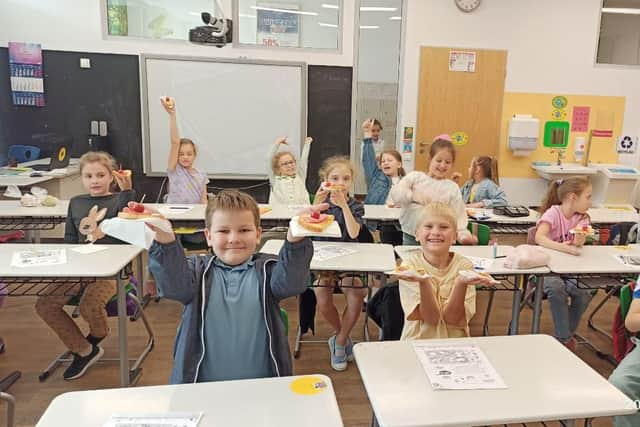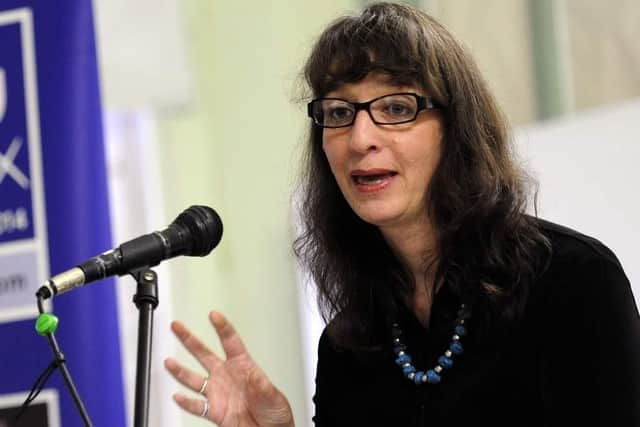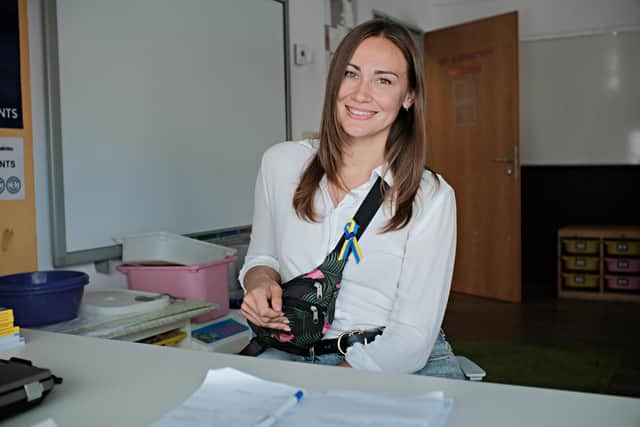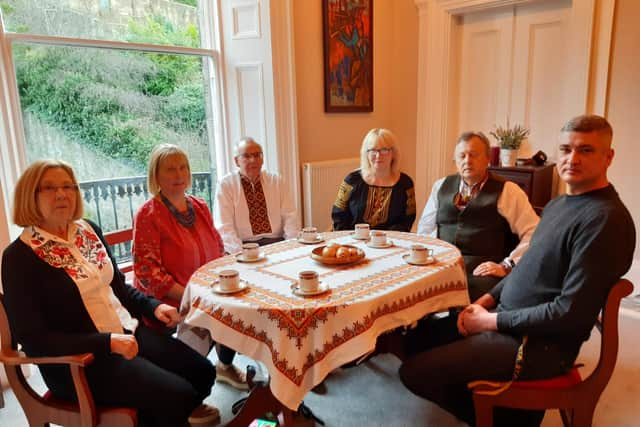Homesick Ukrainians in Scotland opt for online schooling to keep links with home country
Instead, she logs on to catch up with the online work set by her teachers back home in Ukraine.
Yuliya, who fled to Scotland with her mother, Tanya*, after war broke out earlier this year, has been attending a local school and will move to high school in August. However, she will continue to follow the Ukrainian curriculum online, in a bid to ensure she does not fall behind her peers when she is able to return home.


Advertisement
Hide AdAdvertisement
Hide AdEducation authorities in Ukraine have made materials and resources available to children to access from wherever they are living across the world – while some individual schools are also holding online classes.
In Scotland, refugee children are entitled to a school place – and expected to take it up. The New Scots refugee strategy published by the Scottish Government in 2018, states refugees need to be integrated into mainstream education as soon as possible, in a bid to include them in Scottish society.
However, many Ukrainian families hope they will return home as soon as possible – and fear by putting children into the Scottish system, they will fall behind classmates who are following the Ukrainian curriculum.
Tanya is happy to send Yuliya to a Scottish school to meet other people her own age, but is keen for her daughter to keep up her studies in Ukrainian.


"For her, [going to school in Scotland] is a good opportunity to learn the language a little and learn something completely different and it helps her to integrate here,” she says. “But the difference in curriculum is not compatible. We want to return to Ukraine as soon as we can, so she needs to continue with Ukrainian schooling, otherwise she will not be able to catch up.”
Linda Antoniuk, a member of the Edinburgh Ukrainian Club, said around half of families she has met at the centre are planning for their children to continue with online schooling from Ukraine in the new term – while attending school in Scotland.
"Around half of the families I know will look at some online schooling from Ukraine, but will enrol their children in school in Scotland as well,” she said. “Education is very important to Ukrainians. They want their children to go to school here so that they can learn some English and also meet other people their age, but they want to keep up with the Ukrainian curriculum as well.


"They are all hoping to go back as soon as they can, especially mothers with children, as a lot of them have fathers still in Ukraine.”
Advertisement
Hide AdAdvertisement
Hide AdAcross Europe, while some children are attending local schools, others are studying the Ukrainian curriculum at dedicated schools, staffed mainly by Ukrainian teachers who have also fled the war.
Ukrainian Kseniia Shyriaiev, who runs one such school in Cluj, Romania, is horrified at the idea of Ukrainian children being integrated into a local school system.
"Our children are under stress because of war and a second stress would be that they would have to go to local schools like in Scotland,” says the former events manager, who set up the UA School in Cluj after a chance meeting with a senior member of staff at a local private school in the city, who offered the Ukrainian community space in their school building.


“It wouldn’t help, the families should be able to make a choice for their children to learn in Ukrainian schools."
She added: "Our biggest desire for everybody is for the war to stop and for us to go back home. By learning in an environment dedicated to them, children from Ukraine will have the opportunity to have a greater experience of normalcy and childhood.”
The children will study the Ukrainian curriculum for a few hours every evening, from 4pm, when the regular school finishes and Romanian children vacate the classrooms, but will supplement their learning with online lessons from the Ukrainian Ministry of Education during the day.
Similar set-ups are being created across Europe, where although refugee children technically have the right to attend a local school, many have not taken up a place due to concerns about language.
Professor Alison Phipps, UNESCO Chair in Refugee Integration through Languages and the Arts at the University of Glasgow, believes the creation of Ukrainian schools in Scotland, run by Ukrainian teachers, could help fill a gap in the short-term as councils struggle to find space in local schools.
Advertisement
Hide AdAdvertisement
Hide AdShe pointed to the flood of arrivals through the Scottish Government’s super sponsor scheme, which was suspended last month as the government tries to clear the backlog and find longer term accommodation for Ukrainian families.


She said: “Right now with the Home Office putting people into hotel accommodation and into a boat on docks, it’s just not possible [for all children to find mainstream schooling], so the ad-hoc setting up of Ukraine-based schools for Ukrainian refugees, teaching in the mother language, could be really important.
"However, young people do need to then go into mainstream education if it looks like a war is going to continue and they’ll be here for quite a long time.”
She added: "For those who are part of a mass evacuation, like we see here with Ukraine, or like we saw with Syria, this is really quite a sensible approach. However, often, there is a great deal of optimism about how quickly people will be able to return.”
In Estonia, authorities have turned to a hybrid method of schooling, which will allow Ukrainian children to continue to learn together from mainly Ukrainian teachers – but to also be immersed in the Estonian language, which is akin to Finnish and is not linked to Slavic languages. Just over half of lessons at the Tallin Freedom School will be taught in Estonian.
Meanwhile, in Dresden, Germany, a Ukrainian school has been set up to bridge a gap between newly-arrived students and the German school system. Once they have passed a language test, they are able to move into the mainstream German school system. However, some parents there are also opting for their children to return to online schooling from Ukraine.
“Now parents have to decide if they want to stay or return,” one teacher told website Truthout. “If they want to return [to Ukraine], they should continue with the online classes; if not, they should focus on getting their children into the regular schools, as soon as possible.”
Some Scottish politicians said they would consider debating the idea of separate Ukrainian schools, although the Scottish Government has insisted children arriving from Ukraine should “have access to appropriate education in line with education authorities’ responsibilities”.
Advertisement
Hide AdAdvertisement
Hide Ad"We are actively working with local authorities and partners to support this,” a spokeswoman added.
Scottish Liberal Democrat leader Alex Cole-Hamilton said he had spoken to Ukrainian organisations to offer support in setting up Ukrainian classes after hours or in community centres.
He said: "Among the Ukrainians arriving in Scotland there will be many who have experience of teaching or supporting community classes. We should be supporting them to use their skills and knowledge to help others, particularly children needing to stay on top of their curriculum back home.
"Part of Putin's plan has been to stamp out the Ukrainian culture. We should help those who have fled to Scotland to keep their culture alive and ensure that children do not fall behind in their education."
Scottish Conservative Shadow Secretary for Social Justice Miles Briggs said he would support the idea of Ukrainian schools, but raised fears as to how easy they would be to set up.
He said: “In principle, and if feasible, this is an idea worthy of consideration. I’m just not sure how practicable it would be to deliver in reality.
“While we’d love to provide the best possible education for Ukrainian children, our top priority has to be helping as many refugees as possible flee the war zone back home by offering them safe refuge here. It is essential that children fleeing war face as little disruption as possible as they settle in Scotland.
*Yuliya and Tanya’s names have been changed.
Comments
Want to join the conversation? Please or to comment on this article.
